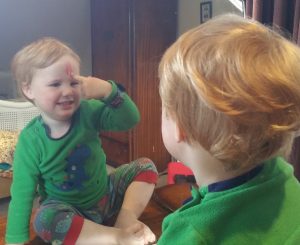It is well established that most children recognize themselves in mirrors by the end of infancy (2 years). However, further research is needed to elucidate how the development of self-recognition impacts on children’s cognition and behaviour. One way to address this gap in the literature is to explore the role of self in young children’s event memory. My PhD research included a series of experiments showing that 3- and 4-year-old children, like adults, are better able to remember items if they are asked to relate them to the self, either physically (by performing an associated action), visually (by viewing the item together with the self-image) or socio-cognitively (by being told they own the item). These advantages imply that physical or cognitive involvement of self has a functional impact on memory as early as 3 years. These effects may be used to improve our understanding of the development of autobiographical memory.
I moved on to collaborate with Professor Shelia Cunningham of the University of Abertay and project postdoc Jacqui Hutchison, to explore how developmental self-reference effects may interact with the ontogeny of autobiographical memory and self-evaluation. This project, titled “The ‘me’ in memory: Exploring the developing self and its influence on cognition” was funded by a 3 year (£106, 336) stipend from the Leverhulme Research Grants Scheme. You can read more about the project in the Leverhulme Newsletter_Jan 2015 and by visiting the ‘me in memory’ project website. The first paper from this project evidences the role of self-awareness in the offset of childhood amnesia. The second demonstrates that different levels of self-referencing have different developmental trajectories across middle childhood. Self-reference effects based solely on the attention grabbing properties of own face onset early and remain stable across middle childhood, whereas self-reference effects based on self-evaluative processing increase between 8 years and adulthood. A final paper integrated development in episodic memory, self-knowledge and autobiographical memory to evidence the development of the self memory system across 3 to 11 years. A parallel programme of research benefited from a Carnegie Research Incentive Grant (£9576) to apply the self-referencing paradigm to explore the role of self in the memory, attention and social processing difficulties of children with ADHD.
Since 2018, we have also been working with teachers to explore the potential for the self-referencing advantage to be applied in the classroom to support literacy and numeracy. Across 2020-2023, we joined forces with Dr Janet McLean, University of Abertay to complete an Economic and Social Sciences Research Council funded (£481, 947) project explored the influence of self-cues on children’s information processing and retention in educational settings, seeking to have translational impact. The first paper from this project shows that the use of personal pronouns in difficult maths problems can improve children’s speed and accuracy, due to capturing their attention.
Professors Cunningham and Ross currently collaborate with Associate Professor Ada Kritikos at the University of Queensland to further explore lifespan developments in self-reference effects.


